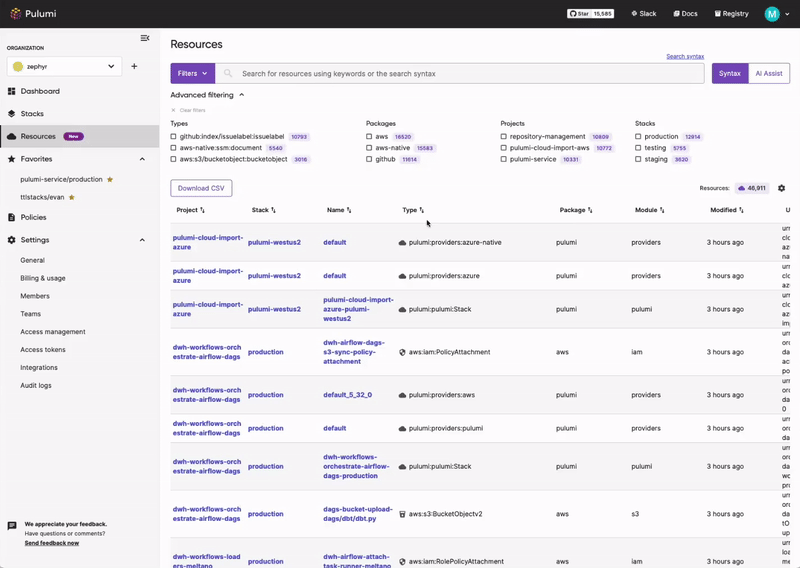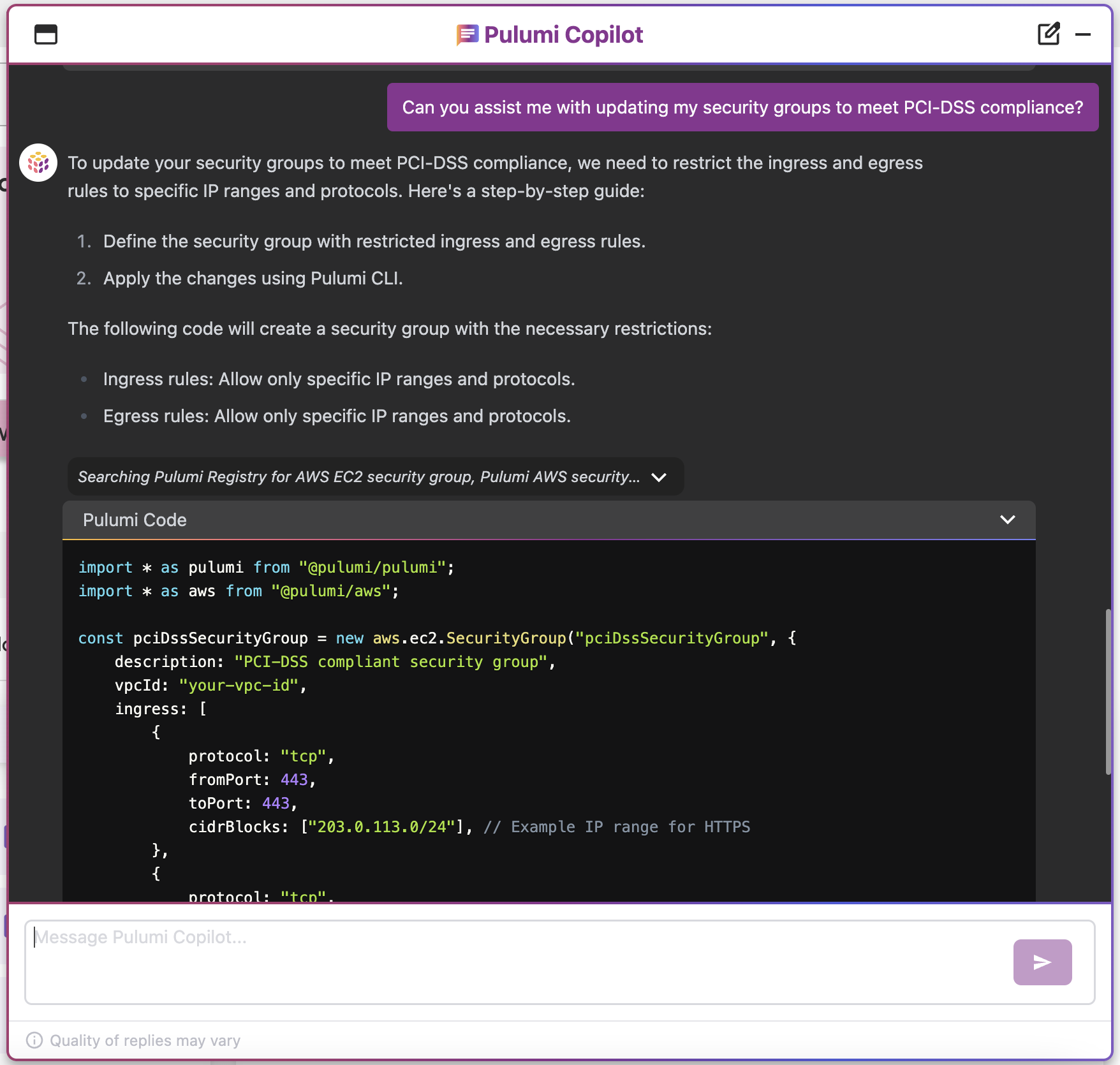How to Achieve ISO 27001 Compliance for Azure Azure AD
How to Achieve ISO 27001 Compliance for Azure Azure AD
ISO 27001 compliance is essential for ensuring the security and management of sensitive information across your organization. Pulumi can assist you in making your Azure infrastructure ISO 27001 compliant. Pulumi can help you identify existing cloud resources that are not in compliance, and it can also enforce compliance policies proactively before infrastructure is deployed. Get started with Pulumi to use these compliance tools or speak with a Solutions Architect to get an expert consultation.
What is ISO 27001 Compliance?
ISO 27001 is an internationally recognized standard for establishing, implementing, maintaining, and continually improving an information security management system (ISMS). It helps organizations protect sensitive data by providing a risk-based approach, ensuring that security measures are proportionate to the risks faced. ISO 27001 is based around the following 3 pillars: confidentiality, integrity, and availability. By achieving ISO 27001 certification, organizations demonstrate their commitment to robust information security practices and regulatory compliance.
Key Aspects of ISO 27001 Compliance
- Risk Management: ISO 27001 requires organizations to assess risks related to their information assets and implement controls to mitigate these risks.
- Security Controls: The standard includes a comprehensive set of security controls (outlined in Annex A) that cover areas like access control, cryptography, physical security, and incident management.
- ISMS Implementation: Organizations must establish an ISMS, which is a systematic approach to managing sensitive company information so that it remains secure. This involves setting policies, procedures, and controls.
- Continuous Improvement: ISO 27001 emphasizes the importance of continually monitoring, reviewing, and improving the ISMS to adapt to changing security risks and business needs.
- Compliance and Certification: Organizations can seek certification to ISO 27001 by undergoing an external audit conducted by a certification body. Certification demonstrates that an organization has implemented best practices for information security management.
- Legal and Regulatory Requirements: ISO 27001 helps organizations comply with legal, regulatory, and contractual obligations related to information security.
Pulumi Insights
Use Pulumi Insights to gain visibility into your cloud infrastructure's configuration to assess ISO 27001 compliance. Pulumi Insights is Intelligent Cloud Management. It helps you gain security, compliance, and cost insights into the entirety of your organization's cloud assets and automatically remediate issues.

Pulumi Copilot
Use Pulumi Copilot to assist configuring your infrastructure to make it compliance ready. You can tap into the Pulumi Copilot's deep understanding of your organization's context to gain visibility into the configuration of resources and assess their compliance.

Compliance Ready Policies
With comprehensive coverage of Azure, Pulumi Compliance Ready Policies provide an enhanced level of control and governance over your cloud resources. Pulumi Compliance Ready Policies empower you to enforce best practices, security standards, cost controls, and compliance requirements seamlessly within your infrastructure-as-code workflows.
What is Azure AD?
Azure Active Directory (Azure AD) is Microsoft's cloud-based identity and access management service that helps organizations manage users and control access to resources. It enables secure single sign-on (SSO), multifactor authentication (MFA), and conditional access policies, providing enhanced security and user experience across applications. Azure AD integrates with on-premises Active Directory, other Microsoft services, and third-party apps to centralize identity management in hybrid and cloud environments.
What controls can I put in place to evaluate Azure AD resources?
- Azure AD roles should not allow full administrative privileges with wildcard actions (*)
- Azure AD users should not have custom roles or policies attached that grant excessive permissions
- Azure AD users' credentials should be rotated every 90 days or less
- Azure AD tenant administrator accounts should not have direct access keys
- Multi-Factor Authentication (MFA) should be enabled for all Azure AD users with access to the Azure portal
- Hardware MFA should be enabled for global administrator accounts
- Password policies for Azure AD users should enforce strong configurations, including complexity requirements
- Unused Azure AD user credentials should be removed after a specified period
- MFA should be enabled for all Azure AD users with administrative access
- Password policies for Azure AD users should have strong configurations
- Ensure Azure AD password policy requires at least one uppercase letter
- Ensure Azure AD password policy requires at least one lowercase letter
- Ensure Azure AD password policy requires at least one symbol
- Ensure Azure AD password policy requires at least one number
- Ensure Azure AD password policy requires a minimum password length of 14 or greater
- Ensure Azure AD password policy prevents password reuse
- Ensure Azure AD password policy expires passwords within 90 days or less
- Ensure a support role has been created for incident management and Azure support
- MFA should be enabled for all Azure AD users
- Azure AD custom roles created should not allow wildcard actions
- Azure AD user credentials that have been unused for 45 days or more should be removed
- Azure AD Privileged Identity Management (PIM) analyzers should be tagged for audit purposes
- Azure AD roles should be tagged for governance
- Azure AD users should be tagged for better access control and auditing
- Expired SSL/TLS certificates managed in Azure AD should be removed
- Azure AD identities should not have excessive permissions like Azure Cloud Shell Full Access policy attached
- Azure AD Access Reviews and Conditional Access analyzers should be enabled for security monitoring
Speak to a Solutions Architect to implement policy as code to manage Azure AD resources for ISO 27001 compliance.
Talk to a Solutions Architect
Get in touch with our Solutions Architects to get all your resources in use with Pulumi Insights